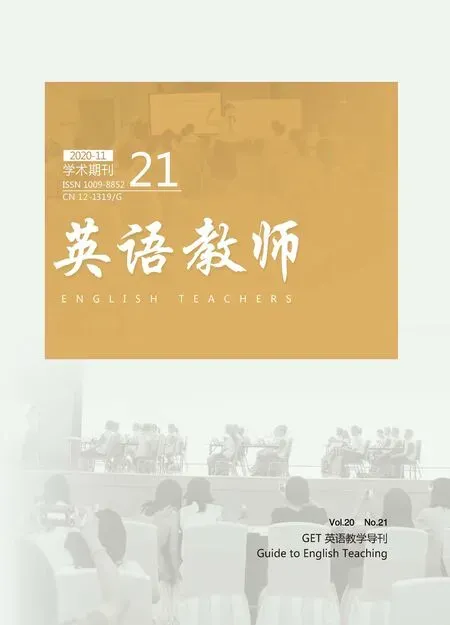借力多模态资源的高中英语课外阅读教学设计
——以课外阅读文本My First Job为例
陈敏之
引言
近年来,教育界呼吁:在“互联网+”时代,英语阅读教学不能停留在传统的注重语言形式的单一教学模式上,而应探索利用多种符号模态(语言、视频、图像、音乐、网络等),充分调动学生的多种感官系统,刺激其阅读后的多方面联想与体验,从而增强他们的记忆,达成阅读教学的效能感(刘东燕 2018)。这也符合《普通高中英语课程标准(2017年版)》(以下简称《课程标准》)对于培养学生听、说、读、写、看等语言能力的要求(教育部2018)。同时,教学研究表明,多模态教学模式不仅能有效激活学生的各种感官,而且可以帮助其强化跨文化交际的文化意识,提升逻辑、批判、创新的思维品质,培养积极、主动的学习能力(吕美嘉、牟为姣 2014)。
一、借力多模态资源的高中英语课外阅读教学案例
下面,以教师执教的高中英语课外阅读文本My First Job(Robert Best)为例,探讨借力多模态资源的高中英语课外阅读课教学设计。
(一)教学内容
授课内容是课外阅读文本My First Job(见附录),这是一篇记叙文,主题是“人与社会”。该文本遵循“情境—发展—结果”的模式,生动地展现了作者的第一份工作,其中包括到达工作场所的路途、学校概况、校长、教学要求、薪酬水平等信息,并从中体现作者的情绪变化(from bad to worse,and from worse to the worst)及其选择。教学内容与学生的实际生活联系紧密,学生理解起来难度不大。此外,学生可以在判断作者的选择明智与否的过程中培养批判性思维和发散性思维。
(二)学情
授课学生英语基础扎实,具备良好的英语阅读能力,能够听懂全英文授课。同时,学生能够通过合作学习,较恰当地描述问题和进行评价。
(三)教学目标
为了提升学生的英语学科核心素养,基于以上对教学内容和学情的分析,并结合《课程标准》,教师将教学目标设定如下:
通过本堂课的学习,学生能够:
1.learn new words and phrases by finding out the vivid and detailed descriptions of what the first job was like(Linguistic competence);
2.acquire advanced reading skills by figuring out the order of the passage and the basic elements of a narrative story(Learning ability);
3.gain practical social skills by inferring what factors should one pay attention to in future job hunting(Cultural awareness);
4.develop critical and divergent thinking ability by commenting on the author’s choice and reflecting on themselves(Thinking ability).
(四)教学流程及活动
Step 1:Lead-in
(1)视频导入,激发学生的文化意识
在课前热身阶段,教师播放一段访谈视频Job Hunting in America,让学生了解就业形势的严峻及找工作过程中要考虑的因素。
(2)思维导图,培养学生的发散思维
视频播放结束后,教师以找暑期兼职为例,向学生提出问题:“When you are looking for a part-time job,what factors ofit do you care about most?”在学生回答后,教师以思维导图的形式在黑板上书写他们的答案,如 salary/wage,workingcondition,workmates,boss,workingtime,tasks等。
【设计说明】本环节旨在活跃课堂气氛,拉近师生之间的距离。同时,基于课前的视频片段及学生已有的背景知识,教师创设真实情景,激发学生与背景相关的文化知识。
(3)梳理结构,提高学生的阅读效能
Step 2:Pre-reading
Task 1:Understand the title and the editor’s note.
标题是文章的“眉目、文眼”,从具有象征意义的标题中可以找出文章的线索,也可以找到作者情感的出发点。而编者按是作者给文章加注的提示性说明,切中要点,言简意赅、画龙点睛。这篇文章的特殊之处在于:既有标题,又有编者按。学生可以基于标题和编者按对文章进行大胆、合理的推测,得出作者第一次工作的经历是anunhappyexperience。
【设计说明】读前预测活动培养学生利用已知信息推测未知文本的能力,从而帮助其了解标题与编者按的功能,构建文化知识,提高他们的阅读效能,让其接近文章主题,进入最佳阅读状态。
Step 3:While-reading
Task 2:Skimming.
教师引导学生预测文本内容后通过略读快速梳理文章的逻辑架构,即Application和Interview两个部分,其中第一部分包含作者申请工作的原因和预期,第二部分用图表的方式让学生概括出与工作相关的信息:到达工作场所的路途、学校概况、校长、教学要求、薪酬水平等。这是文章情节发展的线索和脉络。
【设计说明】该环节旨在培养学生通过扫读快速归纳文章大意、整合文本信息的能力。学生可以从整体上把握文章结构,感知语篇所传达的深层信息。
(4)自绘漫画,发展学生的思维能力
Task 3:Scanning.
教师让学生精读“到达工作场所的路途”部分,并提问:“How was his journey to the school?How do you know that?What else made his journey awkward?”之后,追问“How did he feel about it?”让学生了解作者的赴校之旅颇不宁静,加上天气炎热,归纳出AwkwardJourney,初体验便是bad。此外,教师以此为例,把全班分为三个学习小组,分发学案,引导学生按照experience—feeling的架构整合文章信息,并由一名代表展示小组合作的成果。同时,教师板书,呈现作者情绪降级的过程。
在此基础上,教师向学生提问:“Did Robert accept the job?Why?”部分学生对文本中“This was the last straw.”的理解存在偏差,教师便作出了解释,使学生理解女校长是让作者放弃这份工作的“最后一根稻草”,也符合读前活动中学生基于标题和编者按对作者情绪的预测,即goes from bad to worse,from worse to the worst。
数学教学的创新改革对社会发展的意义并不完全是传授相关知识给学生,而是要促进学生更好的掌握数学这门学科的技能以及思想方法。然而,想要改善我们目前对数学教学的方式,既可以让学生有效的学到知识,又可以提高教学效率和成果,利用数学图论竞赛是极其重要以及必要的。
【设计说明】教师运用直观方式唤起学生的阅读记忆。此外,学生在合作探究和小组展示过程中强化了对文章信息的理解和把握。
Step 4:Post-reading
Task 4:Discussion.
在阅读、分析文本后,教师提出以下问题:“Do you think Robert made the wise choice?Why or why not?”“DoesRobert still think he made the wise choice?”涉及对文本中“Iwasveryyoung”的理解。该处饱含作者对于自己决定的后悔——尽管这是一份不起眼的工作,但是校长及其妻子满怀激情,为了三个年级十多名学生坚持全科教学,让人感动。
Task 5:Homework.
教师布置如下作业:
The writer plans to give up taking the job,but he hasn’t decided yet.Write a letter to him to give him some advice and state your reasons.
【设计说明】通过学生讨论和教师分析升华主题,让学生关注文本背后的信息。课后作业是对课内文本解读的延伸。
二、课后教学反思
(一)利用多模态教具,激发学生的学习兴趣
本堂课利用视频、图片、表格、板书等调动了学生的听觉、视觉及其他模态的协同合作,为其营造了轻松、有趣的阅读环境,有效增强了其在英语阅读中的多元识读能力,提高了阅读课堂教学的生动性和有效性(王磊、马莉 2019)。
(二)坚持生本课堂,让学生作主
教师坚持学生是课堂主人翁的理念,让学生在理解文本的基础上,依照前期铺垫展开小组活动(鲁子问 2010)。此外,课内讨论和课后作业都激发了学生的批判性思维和发散性思维能力,并让他们主动说出自己的想法,把想法落实成文字,完成了一系列完整的听、说、读、看、写的过程。
结语
“互联网+”时代为多模态教学进入课堂提供了基本的技术条件。一线英语教师应探索新型教学模式,摸索出一套符合各学段学生认知规律的教学方式,为其尽可能搭建轻松、自由的阅读环境,这对于英语教学和学生能力培养都有着积极意义。
附录
Trying to make some money before entering university,the author applies for a teaching job.But the interview goes from bad to worse...
My First Job
Robert Best
While I was waiting to enter university,I saw advertised in a local newspaper a teaching post at a school in a suburb of London about ten miles from where I lived.Being very short of money and wanting to do something useful,I applied,fearing as I did so,that without a degree and without teaching experience my chances of getting the job were slim.
However,three days later a letter arrived,asking me to go to Croydon for an interview.It proved an awkward journey:a train to Croydon station;a ten-minute bus ride and then a walk of at least a quarter of a mile.As a result I arrived on a hot June morning too depressed to feel nervous.
The school was a red brick house with big windows.The front garden was a gravel square;four evergreen trees stood at each corner,where they struggled to survive the dust and smoke from a busy main road.
It was clearly the headmaster himself that opened the door.He was short and fat.He had a sandy-coloured moustache,a wrinkled forehead and hardly any hair.He looked at me with an air of surprised disagreement.“Ah yes,”he grunted.“You’d better come inside.”The narrow,sunless hall smelled unpleasantly of rotten cabbage;the walls were dirty with ink marks;it was all silent.His study,judging by the crumbs on the carpet,was also his dining-room.“You’d better sit down,”he said,and went on to ask me a number of questions:what subjects I had taken in my General School Certificate;how old I was;what games I played;then fixing me suddenly with his bloodshot eyes,he asked me whether I thought games were a vital part of a boy’s education.I mumbled something about not attaching too much importance to them.He grunted.I had said the wrong thing.The headmaster and I obviously had very little in common.
The school,he said,consisted of one class of twenty-four boys,ranging in age from seven to thirteen.I should have to teach all subjects except art,which he taught himself.Football and cricket were played in the park,a mile away on Wednesday and Saturday afternoons.
The teaching set-up filled me with fear.I should have to divide the class into three groups and teach them in turn at three different levels;and I was dismayed at the thought of teaching algebra and geometry — two subjects at which I had been completely incompetent at school.Worse perhaps was the idea of Saturday afternoon cricket;most of my friends would be enjoying leisure at that time.
I said shyly,“What would my salary be?”“Twelve pounds a week plus lunch.”Before I could protest,he got to his feet.“Now,”he said,“you’d better meet my wife.She’s the one who really runs this school.”
This was the last straw.I was very young:the thinking of working under a woman led to the final indignity.

